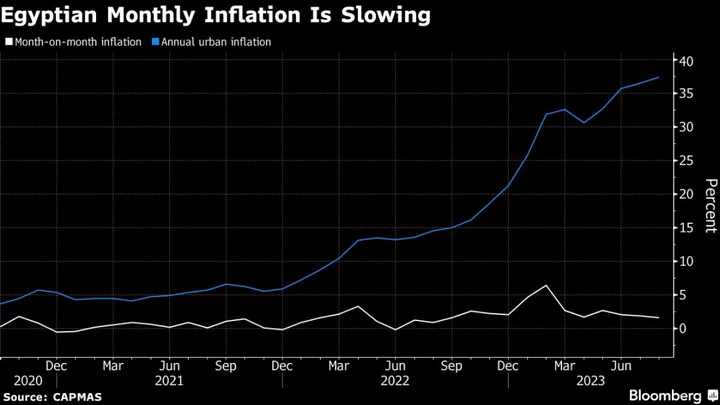Egypt kept interest rates unchanged amid signs of softening inflationary pressures, likely refraining from further monetary tightening until it manages a much-awaited currency devaluation.
The Monetary Policy Committee maintained the deposit rate at 19.25% and the lending rate at 20.25%, it said on Thursday. Eight out of 13 economists in a Bloomberg survey correctly predicted the decision.
“Inflationary pressures will likely continue to ease through the coming months as previous currency moves pass through the base, meaning that the Egyptian central bank’s hiking cycle is likely done for now,” analysts at Emirates NBD Bank PJSC said in a report.
The pause in Egypt followed rate holds in the Philippines, Indonesia, Taiwan and South Africa, as many policymakers in emerging markets struck a cautious tone after Wednesday’s meeting of the Federal Reserve. The US central bank left its benchmark rate unchanged but signaled borrowing costs will likely stay higher for longer after one more hike this year.
In a statement accompanying its decision, Egypt’s MPC said statistics since its August meeting, including inflation figures, “came broadly in line with expectations.” Its plan is to “continue assessing the cumulative impact of previously enacted tightening policies and its transmission to the economy in a data-driven manner.”
The regulator unexpectedly increased rates by 100 basis points last month, bringing official borrowing costs to their highest level in data that stretches back to 2006, and above a previous peak reached during the currency crisis of 2016-2017.
That was a surprise because the governor had said earlier in the year that tighter policy could do little to contain price growth he said stemmed from supply issues. Egypt’s rates are still among the world’s most deeply negative when adjusted for inflation.
In a reminder of risks to Egypt, JPMorgan Chase & Co. said the country has been placed on negative watch for its bond index due to the material currency repatriation hurdles reported by investors. Egypt’s index eligibility will be assessed over the next three to six months, it said.
What Bloomberg Economics Says...
“Egypt’s pound has lost nearly half of its value against the dollar since March 2022. That may not be the end of it. There are at least three reasons why the country will likely devalue again: a large external-funding problem, limited sources of financing, and expectations that the currency would weaken again, which could prove to be self-fulfilling.”
— Ziad Daoud, chief emerging markets economist. For more click here.
The central bank wants to wait until the surprise rate increase filters through, according to Mohamed Abu Basha, head of macroeconomic research at Cairo-based EFG Hermes. While annual consumer prices kept accelerating in the past two months to record highs, monthly trends are “clearly hinting toward a slowdown in inflationary pressures,” Abu Basha said before the decision.
Consumer costs in Egypt are bearing the brunt of three devaluations of the pound since early 2022. The central bank targets inflation of 5%-9% by the fourth quarter of next year, and the government has said tackling soaring costs is a top priority.
A second month of slowdown in core consumer prices — the gauge used by the regulator that strips out volatile items — could also have encouraged Thursday’s pause in monetary tightening.
Those figures may be “signaling the inflationary effects of the pound depreciation have begun to fade,” Monica Malik, chief economist at Abu Dhabi Commercial Bank PJSC, said before the decision.
Annual inflation has been above 30% for much of this year, a challenge for policymakers in the country of 105 million people that’s under pressure to allow more flexibility in the exchange rate to unlock the next tranches of the International Monetary Fund’s $3 billion loan. Authorities need to build up sufficient foreign-exchange buffers to manage any further depreciation.
Now, with elections coming up in which President Abdel-Fattah El-Sisi is predicted to seek a third term, analysts are weighing the impact on the timetable for reforms that may cause more angst for consumers.
El-Sisi in June said the Egyptian people can’t bear additional price hikes stemming from devaluations.
“Any substantial reforms, including another meaningful pound devaluation, would likely occur only after the elections,” Malik said.
--With assistance from Harumi Ichikura.
(Updates with analyst quotes, central bank comments starting in third paragraph.)
Author: Mirette Magdy and Tarek El-Tablawy

